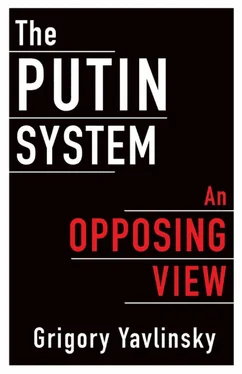Our second but no less important caveat is that the notions used to describe a system’s overall logic not only are subject to individual interpretations affected by personal biases but also change over time. We should always keep this in mind. Any particular term may mean vastly different things in different historical periods. As a result, some seemingly fundamental disagreements over specific political events may be caused by merely a difference in the understanding of certain emotionally charged terms, while being completely insubstantial in practice. This applies first and foremost to such notions as democracy, equality, public good, and the like. Some of the seemingly scientific terms with a broad consensus about their usage are routinely subjected to wide-ranging interpretations that disrupt all prior consensus around them.
With these caveats in mind, let me also note the following about the terminology used. First of all, the term “democratic,” widely used by intellectuals to characterize political systems and developments, should actually be applied with a great degree of caution. It is too abstract when used generically and too subjectively biased and vague when used in specific contexts. It is used more to differentiate oneself from the “other” than to denote a sum total of specific characteristics or political tools.
As we know from history, neither universal voting nor the existence of political parties nor the absence of criminal prosecution for political speech or for a criticism of the authorities—in sum, no single mechanism among those currently identified by mainstream Western intellectuals as being “democratic”—can be assumed to be a universally applicable, characteristic feature of democracy or its defining element. Moreover, even when taken together, these elements can produce political systems that are fundamentally dissimilar in spirit and in the direction of their development. Thus, the division of countries into “democratic” and “undemocratic” still ends up being colored by one’s personal bias toward identifying with the “good guys,” as opposed to the “bad” and the “other.”
It is more meaningful to characterize political systems on the basis of a different pair of notions: that of a competition-based system, in which political groups openly vie for power against each other within a set of mutual restraints, versus an authoritarian system, in which power is not acquired within the legal framework of an open political competition. In a competition-based system, power is distributed, one way or another, among different centers of authority that most often serve as alternatives to each other; in the authoritarian case, one leader or a group organized along corporate lines single-handedly has a grip upon the exercise of power.
Accordingly, the mechanisms of transferring power from one group to another are different in each case. In a competition-oriented system, power is transferred through an electoral process whose legitimacy is recognized by all participant groups but is not single-handedly controlled by any one of them. Meanwhile, in an authoritarian system, power is transferred by an arbitrary decision of the ruling group or its leader on the basis of specific power relationships. Under this scenario, the particular manner in which the power gets transferred is not all that important. Under an authoritarian system, power can be transferred either by a simple appointment, by a top-down restructuring or reforming of the machinery of governance, or through general elections, provided that the outcome can be engineered in advance. Under a competitive system, there can be a wide variety of specific electoral systems, with dozens or even hundreds of different arrangements, whereby officials may be elected directly, indirectly, or in a multiple-stage process, and with different sets of both voters and candidates. In a competitive system, even the number and the character of restrictions on the electoral process is not critically important.
What is most important is that the system must provide an opportunity to remove a ruling team or group from power, in a transparent and institutionally determined manner, so that the rulers cannot establish the length of their own terms in power and cannot predetermine their successors. In other words, the system must guarantee that any group of rulers will have no choice but to step down, without an opportunity to name a successor whose ascent to power it would be able to secure.
Naturally, the prerequisite for such a system is that no single group has an effective grip on power and that power is spread out among at least two or three or more groups, each wielding the requisite legal tools of organized coercion. Accordingly, the primary characteristic of a competition-based political system is that no single individual or group of people has full power and no one can issue decisions without considering how other groups and political forces will respond to them. Most importantly, such a system has embedded safeguards against any attempt to usurp power in the country. In other words, any individual or group of people having access to the levers of power are fully aware that their attempt to cross the boundaries of their authority will immediately trigger the mechanisms whose end result will be the use of legally organized coercion to push them back to where they belong.
We can agree to call a competitive political system “democratic,” as many often do. Yet, at the same time, we must keep in mind that, in this context, the term “democracy” is related to its original Greek meaning—“people’s power”—in approximately the same manner as economic agents in real life relate to the ideal homo economicus from classical economic theory—an imaginary human being from a textbook, which has no personification in reality. In other words, we can use the term “democratic” as long as we realize that its factual meaning in this case has little in common with its formal definition.
In any case, “democracy” here does not mean “people’s power” or “power for the people” or even “power in the interests of the people.” Rather, it is simply a characterization of a political arrangement under which power is not concentrated in the hands of any one elite group but instead is distributed among several groups in accordance with specific rules that secure an alternation of different groups in government. It is also a system that relies upon compromise among these groups, rather than everybody’s subordination to the will and the interests of a single dominant group. Either way, at present, competitive and authoritarian systems of governance exist in about equal numbers in the world around us. It seems that no one has yet been able to come up with a formula explaining the emergence of a particular system and its occasional transformation into its opposite—at least not in a clear and compelling way.
This is not to say that there are no theories about it; there are plenty. Moreover, the spontaneously developed and informal community of professional economists and political scientists has formulated (and named after themselves) a variety of hypotheses on this subject, by going through virtually every conceivable relationship between types of political systems and such factors as the level of income and wealth, the rates and quality of economic growth, the stages of an economic cycle, and so on. [2] For an extensive if not an exhaustive list of such hypotheses, see, for example, Sergey Guriyev and Oleg Tsyvinsky, “ Ratio economica : Demokratichnyi krizis,” Vedomosti 161 (3175), August 28, 2012.
However, every such hypothesis is met with a counterhypothesis. Meanwhile, the general issue of what comes first—democracy or economic growth—has long since been elevated to such theoretical heights that any attempts to apply it to derive real-life conclusions are hardly ever taken seriously by anyone any longer.
Читать дальше












